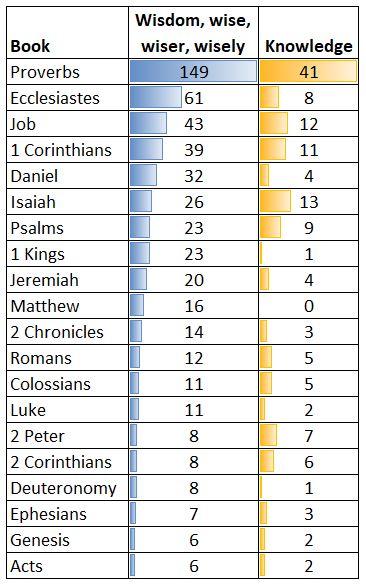In short
Poetry in the Bible is also classified as “wisdom literature,” but wisdom is a theme throughout the Bible. Solomon is a key figure in this.
Why it is important
The pursuit of it is both praised and discouraged.
Solomon and the “wisdom literature”
King Solomon is legendary for his wisdom. You probably know the story (1Ki 3) where the LORD tells Solomon to ask for anything, so he asks for wisdom. And it says he was the wisest man ever to live until that point (1Ki 3:12).
So, it’s no surprise that books written or closely associated with Solomon are heavy on wisdom. In fact, these books are called the “wisdom literature” of the Bible. They are:
- Proverbs (the first sentence says it’s by Solomon)
- Song of Solomon (ditto)
- Ecclesiastes (debated, but in my mind only Solomon fits the description*)
- Psalms (some are written by Solomon)
- Job (a bit more obscure**)
Usage
I included a chart*** of scriptures containing “wisdom” or knowledge.”
As you would expect, the top three are
- Proverbs (by a LONG shot)
- Ecclesiastes
- Job
And no surprise, the top ten also includes three of the longest books of the Bible: Psalms, Isaiah and Jeremiah. 1 Kings and 2 Chronicles are also in the top twelve (or so), and that makes perfect sense as they are about Solomon as king (Mr. Wisdom himself).
Number 4 surprised me the most, though: 1 Corinthians. The next time I read from it, I will have to look for wisdom as a theme!
Daniel was a “wise man” in Babylon, so that makes sense for the book of Daniel to be up there also. Matthew seems to have focused on that aspect of Jesus, which, to me, implies Solomon as a type of Christ.

Theology and doctrine
Wisdom is good: the purpose of Proverbs is “To know wisdom and instruction, to understand words of insight, to receive instruction in wise dealing, in righteousness, justice, and equity; to give prudence to the simple, knowledge and discretion to the youth” (Prov 1:2-4).
And yet Eve’s folly was when she “saw that the tree was good for food, and that it was a delight to the eyes, and that the tree was to be desired to make one wise” (Gen 3:6).
The key difference, I would say, is where you try to get wisdom. Without permission would be the first mistake. From the wrong person would be another. The introduction of Proverbs continues by assessing, “The fear of the LORD is the beginning of knowledge; fools despise wisdom and instruction” (Prov 1:7).
Footnotes
* Ecclesiastes 1:1 and 1:12 say it is written by “the son of David,” who was “king over Israel in Jerusalem.” Yes, I know that “son” can mean any descendant. But you can’t argue that there were only three men who were “king over Israel IN JERUSALEM.” (Other kings of “Israel” were in other cities, like Tirzah or Samaria.) Well, Saul was not David’s son, and neither was David, so that brings us to one man: Solomon. Scholars think it might be Hezekiah for some reason.
** Solomon was wiser than “all the people of the east” (1Ki 4:30) while Job was “the greatest of all the people of the east” (Job 1:3). Both men were very wealthy and righteous (at first). And wisdom certainly is a theme of Job as the chart shows.
*** My thinking on this chart:
- I used the ESV translation and I think it nails the translation on these words. The Hebrew words are really tricky (they can mean “skillful,” like the people that worked on the tabernacle), but the ESV uses “wise” in the way I expect.
- I searched for “wisdom, wise, wiser, wisely” and “knowledge” (but not “know, knows or knowing”). I found that “know” is used in really common ways that made it irrelevant for this study.
- Also, no offense to KJV-lovers, but the KJV uses “wise” in the sense of “way” (“in this wise”), which also made it unusable for a brute-force word study.

No responses yet